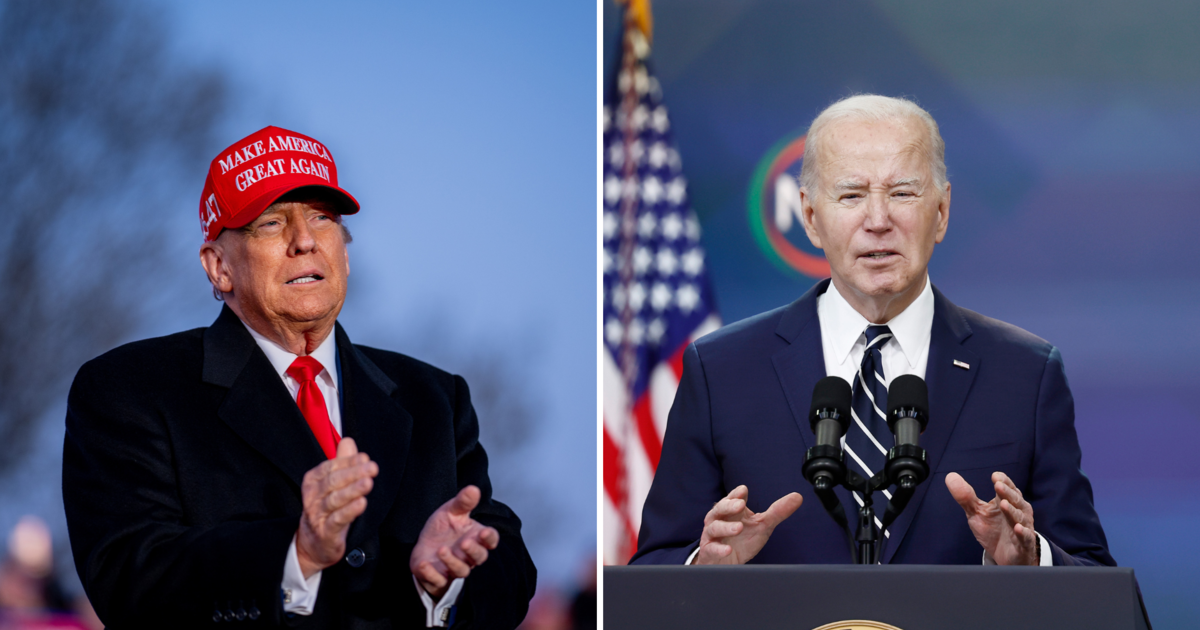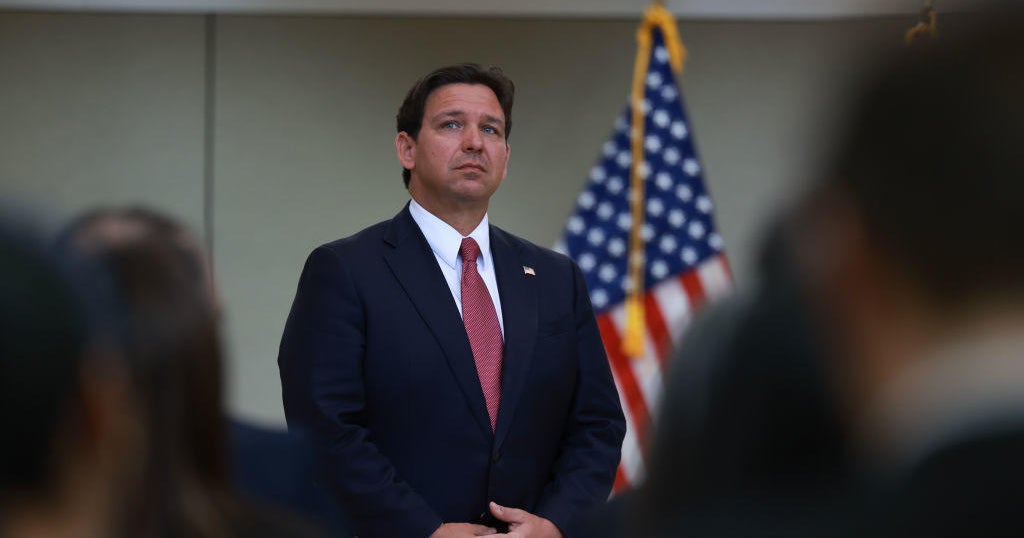How the 2024 presidential candidates talk about taxes and budget challenges — a voters' guide
Soon after inauguration, the next president will be steering the toughest budget debates in decades, as individual tax rates expire and the debt limit will have to be suspended or raised.
Congressional Democrats and Republicans have already tangled this year over the debt limit, and what's coming is likely even more daunting. A general "erosion of governance" concerned Fitch Ratings enough to cause analysts to cite it as one reason for dinging the U.S' sterling creditworthiness, knocking down U.S. debt from the gold-standard "AAA" rating to an "AA."
On the campaign trail, presidential candidates are claiming they can balance the budget, but here's what experts say about the dominant fiscal policy ideas in the race so far and their ability to solve the nation's budget math.
The big financial challenges:
2025 rewriting of tax codes could affect most U.S. households
The next president will have to deal with a possible rewrite of tax law soon after taking office.
During the Trump administration, the Tax Cuts and Jobs Act of 2017 permanently lowered taxes for corporations and cut individual tax rates for most households. Those individual tax rates are slated sunset by the end of 2025, along with other parts of the law.
The 2024 elections will decide whether Republicans may extend the the taxes they pushed through, Democrats rewrite the rates for the top brackets, or a split Congress or split executive and legislative branches wrestle over revenue.
Lawmakers will be weighing how much help to give families using the Child Tax Credit and the standard deduction—or what portion of a taxpayer's income should not be subject to taxes. Those figures set in the 2017 law will be slashed unless they're renewed.
According to Garrett Watson, senior policy analyst for the right-leaning Tax Foundation, unless one party wins the White House, the House and a super majority in the Senate in 2024, Americans could see a return of the playbook for the extension of the Bush-era cuts. In short, not much changed for the majority of taxpayers, but lawmakers fiddled with rates on the rich.
The fate of Bush tax cuts was a campaign issue in the 2008 and 2012 presidential contests. Ultimately, bipartisan majorities signed onto a "fiscal cliff" deal in 2012 that cemented most of the 2001 and 2003 tax cuts into law, while allowing tax rates to rise for those in the top income brackets.
But Watson warns higher interest rates on the U.S. debt means covering the cost of the 2017 tax cuts will be more difficult than it was about a decade ago.
"The math is going to be hard this time around," Watson said.
Budget ideas on the 2024 campaign trail
"We're going to raise taxes on the rich, but no one making under $400,000 will see a penny of tax increase."
Who's saying this? President Biden often makes this promise and has repeated it in recent speeches.
Raising taxes on the wealthy is popular with Democratic and even some Republican voters, according to polling. But budget experts doubt that a second Biden administration could cover the cost of extending the 2017 tax cuts for those making under $400,000 by hiking taxes on the rich.
"The math is just tricky to do on that," Watson said. "You really have to raise taxes quite a bit on the top to fully cover the cost of making the rest of it permanent."
Mr. Biden, in his last budget, proposed raising the top individual tax rate from 37% to the 39.6% — what the rate was before the 2017 tax cuts.
The Committee for a Responsible Federal Budget estimates that change would save $255 billion over a decade. But it says Biden's revenue-raising plans — including raising corporate tax rates, increasing capital gains taxes, and ending tax breaks for fossil fuel companies — don't go far enough.
The CRFB's analysis concluded that Biden's 2024 budget plan would decrease budget deficits by $3 trillion over a decade but would still fall "well short" of the reduction needed to put the nation on a sustainable financial path.
"We'll make billionaires pay up."
Who's saying this? President Biden made this comment during recent "Bidenomics" speeches. And he often says it on the campaign trail.
His "billionaire tax" would impose a 25% minimum tax on the unrealized capital gains of households with a net worth of $100 million or more (so, not just billionaires). That policy proposal has drawn plaudits from some prominent economists. But it's an untested idea that may be hampered or stopped by the courts.
This year, the Supreme Court is set to hear Moore v. United States, which could determine the fate of efforts to tax wealth. The court will decide whether a one-time tax levied in the 2017 Tax Cuts and Jobs Act on shareholders who owned 10% or more of foreign corporations was legal under the 16th Amendment — which concerns the right of Congress to implement a wealth tax. The Supreme Court's ruling in this case will likely set a precedent on whether illiquid assets can be taxed.
Even if the legal hurdles are cleared, a tax on unrealized gains would still be challenging to implement.
The Tax Foundation, a think tank founded by businessmen, laid out some of the difficult questions the Treasury Department and IRS would grapple with, including the valuation of non-tradable assets and "how to treat illiquid taxpayers who may have paper gains but lack cash on hand to pay their minimum tax bill."
The group argues this mode of taxation could discourage angel investing and entrepreneurship.
"We'll extend the Trump tax cuts."
Which candidates are saying this?: Most Republicans praise the 2017 tax cuts. Bloomberg reports Vivek Ramaswamy and Francis Suarez are the only candidates not to speak favorably of the cuts yet.
- Trump, not surprisingly, has said, "We have to extend the tax cuts."
- DeSantis has proposed extending them, too.
- Mike Pence called for extending them in his campaign launch speech.
It's unlikely Republican contenders will be inclined to talk about tax hikes on the trail, except to reject them. But the next president may be drawn into a fight over the fairness of U.S. tax rates if government is divided. Progressive tax analysts argue the 2017 Tax Cuts and Jobs Act disproportionately benefitted the rich and made the wealth gap bigger. Even a sizable portion of Republican voters — about 43%, according to a recent PEW poll — say they're bothered by the feeling wealthy people don't pay their fair share.
If Republicans want to extend the Trump-era cuts for all income brackets, they'll have to cut spending significantly to cover the cost without adding to the deficit.
Analysts estimate extending the 2017 cuts would add $3.6 trillion to the debt over 10 years. That's on top of what the Tax Cuts and Jobs Act has already cost in lost U.S. revenue: $1.7 trillion by the end of fiscal year 2023, some analysts say.
"We're not going to touch Medicare or Social Security payments"
Who's saying this?
- Biden and Trump have both said this.
- Florida Gov. Ron DeSantis has said "We're not going to mess with Social Security as Republicans," though he's also signaled openness to changing the program "for people in their 30s and their 40s so the program's viable."
Politicians who talk about controlling unsustainable spending also often say they'll avoid changes to Social Security and Medicare. But those programs eat up more government funding than any other, and they're running out of funding.
When the programs first started, life expectancy was lower and birthrates were higher, so there were enough people paying payroll taxes to support the benefits going out to the old. Now the aging population has become the defining fiscal challenge of the next few decades, according to Elaine Kamarck, director of the Center for Effective Public Management at the Brookings Institution.
"You've got the baby boomers retiring, therefore Social Security payments are going out and old people get sick. And so they're going to cost more and more in Medicare too," Kamarck said.
If elected officials don't make changes to Social Security and Medicare programs there will be painful benefit cuts in the next decade. Benefits won't entirely evaporate, but Medicare Part A spending will have to be sliced by 11% in 2031 and retirement benefits are set to be chopped by nearly a quarter when the Social Security fund runs dry in 2033.
Those dips would mean penny-pinching for a large number of old people who rely mainly or entirely on Social Security for their income (The program provides at least 50% of the income for 40% of retirees, according to SSA research.)
"We'll raise retirement age to keep Social Security solvent"
Who's saying this?:
- Chris Christie supports raising the Social Security retirement age for people now in their 30s and 40s.
- Pence has said changes to retirement age "certainly should be on the table."
- Nikki Haley favors raising the retirement age for people now in their 20s and has said: "It is unrealistic to say you're not going to touch entitlements."
Some Republican candidates have risked losing support to advocate for raising the age of retirement for workers from its current level, which is 67, for those born after 1960.
But such a change wouldn't be immediate. None of the candidates want to change the retirement age for voters nearing retirement in the next decade or so. And analysts point out there are ways to design the policies so the retirement age could stay as they are for those who do backbreaking physical labor.
Maya MacGuineas, president of the CRFB, said an increase in the retirement age is a sensible idea that would help modernize Social Security.
"When Social Security began, retirement age was 65, and life expectancy was 62," MacGuineas said. "Today, the retirement age is 67 and life expectancy is in the 70s and 80s."
But Eugene Steuerle, a fellow at the Urban Institute, argues a phased-in retirement age hike wouldn't fully solve the most pressing problems for the entitlement program.
"The system's gone so far out of balance that raising the retirement age is not enough to get you very far," Steuerle said. "It's not going to get over the current crisis, which is basically due to the fact that the Baby Boomers are retiring. They started retiring about 2008 on Social Security and they'll be done around 2035 or so."
"We'll cut a percentage of the federal workforce."
Which candidates are saying this?
- Asa Hutchinson said in his campaign announcement speech that he'd cut 10% of the federal workforce.
- Vivek Ramaswamy has advocated cutting 75% of executive branch employees to shrink the "administrative state."
Many GOP candidates think slashing the federal workforce would help, even though only a few have been specific. DeSantis called for "slitting throats" in government. But trying to attack bloat in the federal workforce would likely take long and result in only modest savings.
Hutchinson's proposal would save the government as much as $350 billion over ten years if workers were laid off immediately, according to the CRFB. The U.S. ran a budget deficit of $1.4 trillion last year, so cutting hundreds of thousands of people from the federal workforce would save enough in a decade to fill in about 25% of just the 2022 budget gap.
And that's if the employees were terminated immediately, which would require changes to existing laws protecting federal workers.
More likely, the federal workforce would be reduced by attrition, as government employees leave or retire and aren't replaced. Trimming by attrition shrinks possible savings to $150 billion over 10 years, according to analysts.
Then there's the question of where precisely the cuts would come from. Of the 2.25 million civilian workers, 60% of them work for the Departments of Defense, Veterans Affairs and Homeland Security — which Republicans have been loath to slash.
Cutting from other departments wouldn't be easy for Republicans either, says Bobby Kogan, senior director of federal budget policy at the Center for American Progress.
"The Social Security Administration is about 60,000 people, and it's already been underfunded for such a long time. They're the people who make sure that the benefits go to the right person, the right amount, on time. Do you want to cut it 10%?" Kogan said. "What about the food inspection folks who make sure that the food we're eating is safe? ...Once you ask them, 'would you cut this,' they'll say, 'no.'"
MacGuineas says it's reasonable to say that the workforce could be smaller, but voters would have to expect trade-offs.
"You can't pretend that you're going be able to cut 10% and probably not feel differences," MacGuineas said. "Things will be slower. Benefits will not be implemented as efficiently."
"We'll cut entire government agencies."
Who's saying this?
- DeSantis has floated cutting the IRS, and the Departments of Education, Energy and Commerce.
- Pence suggests eliminating the Environmental Protection Agency and the Consumer Financial Protection Bureau.
- Vivek Ramaswamy vowed to shut down the FBI, IRS, Centers for Disease Control and Prevention, Commerce and Education Departments.
Axing government agencies is a popular idea in the Republican field, but it won't solve America's fiscal problems because it doesn't add up to enough savings.
Pence's proposal to get rid of the Environmental Protection Agency would save only $290 billion over 10 years, according to the CRFB.
Plus, money isn't saved if the departments on the chopping block just have their missions absorbed by other agencies.
And shuttering departments may face resistance. The federal workforce is scattered around the country, not just in Washington, D.C., the city voters and candidates love to hate; in fact, only about 15% of the non-postal civilian workforce is pooled in D.C. and the surrounding counties in Virginia and Maryland. So, a president who eliminates a department would likely have to defend the closure to political leaders from states that would be absorbing the job losses — including Texas, which is home to about 7% of civilian federal workers or California which has about 8% of the federal civilian workforce.



